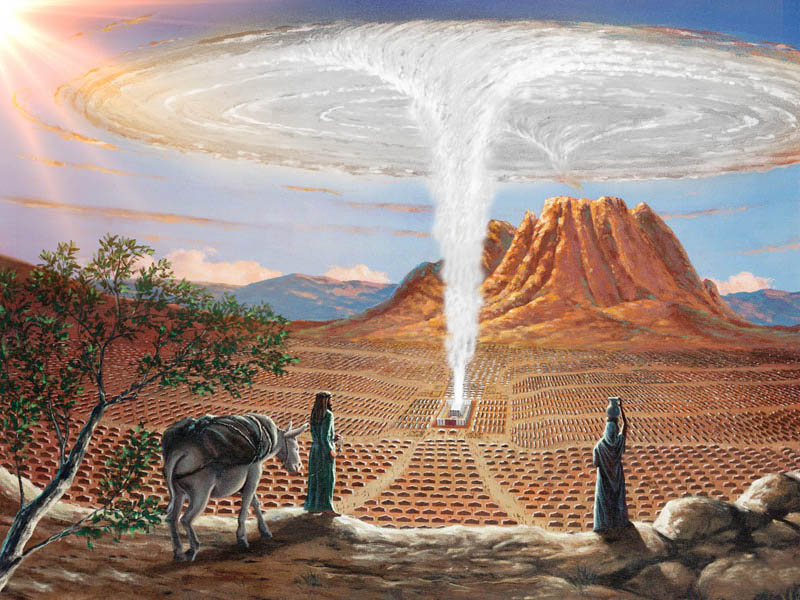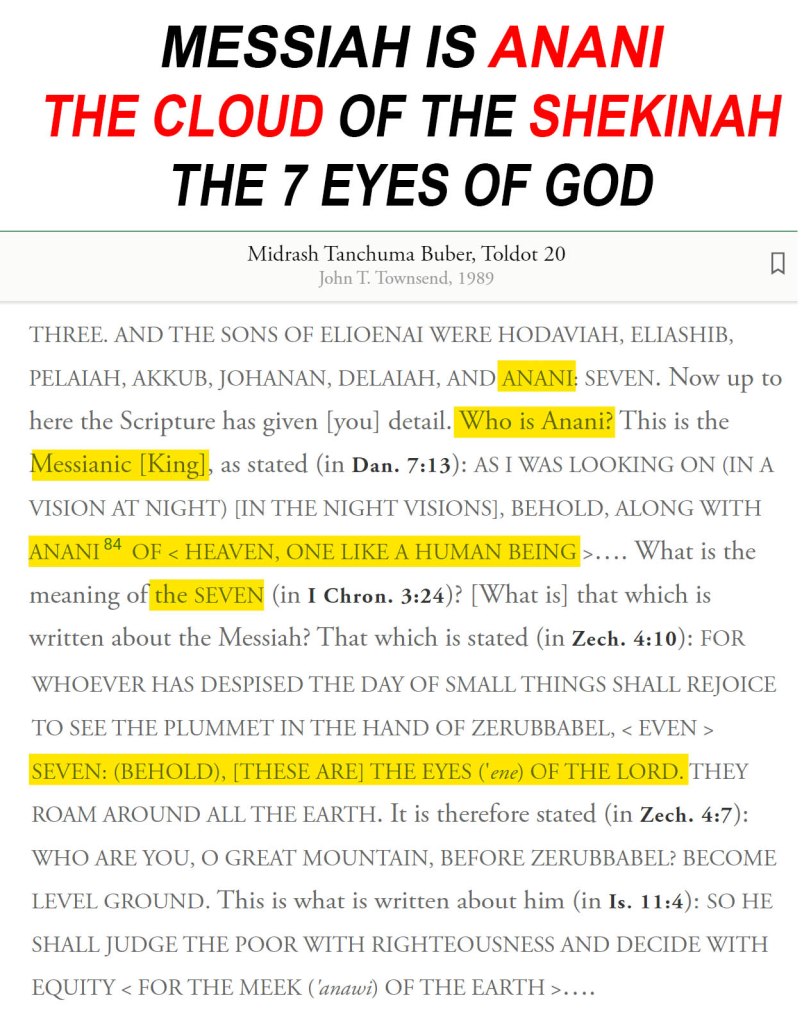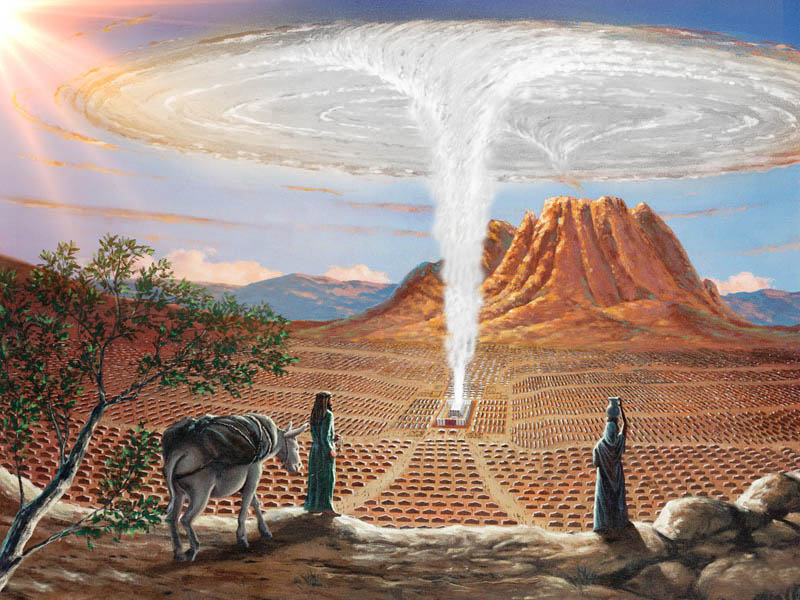
The following is from this source https://www.ourancientpaths.org/post/ananei-ha-kavod-and-the-anani
The phrase “Ananei ha-Kavod” is not found in scripture. It is a phrase that the ancient sages used to describe the “Cloud of Glory” which followed the Israelites during their 40 year wilderness journey. The phrase is composed of two words: anan meaning cloud and kavod meaning glory; or in this case meaning Yah’s “Divine Presence” that accompanied them. We may often call it the “Shekhina”.
The Bible is a living document. No matter how many times it has been read and studied it always has new revelation to reveal to the earnest seeker. Keeping with this frame of mind, I would like to delve a little bit deeper into this “Ananei ha-Kavod” and the prophetical implications for us today.
Exodus 16:10
As Aharon spoke to the whole community of the people of Isra’el, they looked toward the desert; and there before them the glory of Adonai appeared in the cloud; (CJB)
Numbers 17:7
However, as the community was assembling against Moshe and Aharon, they looked in the direction of the tent of meeting and saw the cloud cover it and the glory of Adonai appear. (CJB)
In both of these verses, the Presence of the LORD is said to appear by means of a cloud (anan). The ancient sages recognized that the very Presence of the Almighty Creator, and the God who brought them out of Egypt, was ever present with them in the cloud. This “cloud of His Presence” overshadowed them on their entire journey and provided for their every need. Scripture indicates that the very clothes on their backs did not wear out for the 40 year journey. This Presence also was their sustenance for food and water.
Leviticus 23:42-43
“You are to live in sukkot for seven days; every citizen of Isra’el is to live in a sukkah, so that generation after generation of you will know that I made the people of Isra’el live in sukkot when I brought them out of the land of Egypt; I am Adonai your God” (CJB)
The ancient commentator Rashi has the following to say about the deeper meaning of this verse from Leviticus: “when the Israelites camped during their journey in the desert, they would build sukkot to shield them from the sun” – this he states is the simple meaning of the scripture. However, he goes on to state that the emphasis in the scripture is what Adonai did (not them) “that I made the people of Isra’el live in sukkot when I brought them out of the land of Egypt; I am Adonai your God.” Being aware of the grammatical emphasis, he denotes that the sukkot of the desert was a divine act. Thus, he interprets the word sukkot in this verse to mean the “Ananei ha-Kavod”. He sees it to mean that the “cloud of His Presence” overshadowed them – giving them protection from the desert sun as well as any other threat that would come their way. In other words, His divine presence was their shelter, or sukkah, over them.
The “Shekhina” was their everything: their shelter, guide, protector, shield, sustainer, refuge, protector from all the elements of the desert, etc and the “Divine Presence” appeared to them “as a cloud”. Dwelling inside the cloud, God made them aware of His continual presence.
Truly, today God is with us in this way. His very presence is with us daily, if we only trust in His provision. However, could these very scriptures about His Divine Presence coming with the appearing of a cloud go much deeper? Let’s dive in!
In the Bible we read about a man named Zerubbabel. If you are not familiar with this man then I encourage you to go and study up on him. I will briefly give historical details. He was the rightful heir to the throne of David after the people were carried away into Babylon. As the true prince of Judah, Cyrus made him governor of Judah, and he was given permission and commanded to rebuild the altar and the temple in Jerusalem, which Cyrus wanted rebuilt to the true God. (Haggai 1:1, 14, Haggai 2:21). So, Zerubbabel is accredited with the building of the second temple.
He was the same as Sheshbazzar (his Persian name) Ezra 1:1-11, where he is called the “prince of Judah”, being the rightful heir of King Jehoachin.
The prophet Zechariah clearly speaks of the end times when the rightful heir to the throne, who comes from Zerubbabel, will come: Zechariah 4:6-10.
The genealogy of Zerubbabel (son or grandson of Shealtiel) is mentioned in several locations including Ezra 3:2, 8, 5:2; Nehemiah 12:1, Haggai 1:1,12 and 14 and Matthew 1:12. In Matthew we see that Yeshua comes directly from the line of Zerubbabel; the rightful heir to the throne of David.
In I Chronicles 3:1-24 we actually get the full genealogical record of the descendants of David. In verses 17-24 we find Zerubbabel and his descendants. Keeping in mind that this was written, probably by Ezra, 200-400 years before Messiah Yeshua was born. So, the list would stop long before Yeshua’s birth, but Matthew continues it on for us.
When we read the last verse of I Chronicles chapter 3 (verse 24) we find:
“The sons of Elioenai were Hodaviah, Eliashib, Pelaiah, Akkub, Johanan, Delaiah and Anani– seven in all”. (emphasis added by me)
The lineage ends with the name of a person called Anani. Who was this Anani?
According to the website abarim-publications.com: the name Anani is the name Anan (meaning cloud) post-fixed with the letter “yod”. Some scholars (NOBSE study Bible Name List) assume that the final yod of Anani is a straight forward possessive you: My Anan, or My Cloud. Another way of looking at the name Anani is favored by Alfred Jones (Dictionary of Old Testament Proper Names), who sees the name Anani as a truncated (or rather an apocopated) form of the name Ananiah, which is the name Anan followed by the appellative “hey” (Yah) = (Yahu) = (Yu), which in turn are abbreviated forms of the Tetragrammaton YHWH, or Yahweh. The whole name Anani would thus mean Cloud of The LORD.
In the Targum, the proper name Anani in I Chronicles 3:24 means “cloudy” and comes from the root word anan meaning cloud, and it is tied to the scripture in Daniel 7:13-14:
“I was watching in the night visions, Behold, One like the Son of Man, coming with the clouds of heaven. He approached the Ancient of Days, and was brought into His presence. Dominion, glory and sovereignty were given to Him that all peoples, nations, and languages should serve Him. His dominion is an everlasting dominion that will never pass away, and His kingdom is one that will not be destroyed.” (TLV)
The Targum thus interprets the scripture in
I Chronicles 3:24 as: “Anani [the man coming with the clouds] is the King Messiah who is to be revealed”. It was believed that this would happen in the future and the genealogy of Zerubbabel ended with the coming of the Son of Man, the Messiah; or the revealing of the Son of Man; The Anani. The writer of Chronicles understood, prophetically, that the promised one would come from that lineage of Zerubbabel.
As Chronicles ends the line of David (thru Zerubbabel) with the coming of the Anani – so likewise, Matthew ends his genealogy with Yeshua – the one who will come with the clouds; the prophetic Son of Man described by the prophet Daniel. The prophesied “Anani”.
Scripture records that at His ascension Yeshua was taken up in the clouds, the angel said He would likewise return with the clouds (Acts 1:9-11).
The Divine Presence-Shekinah is the Man who rides the Cloud – Yeshua the Messiah!
Matthew 24:30 – They will see the Son of Man coming on the clouds of heaven, with power and great glory.


Leave a comment